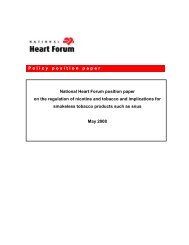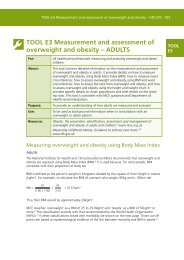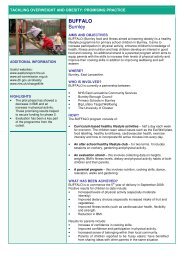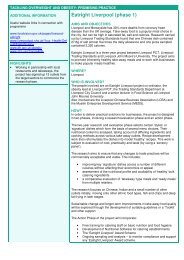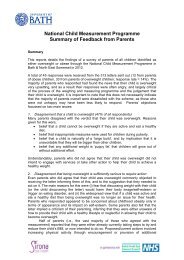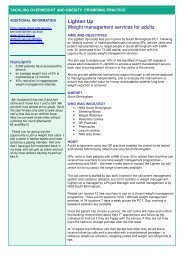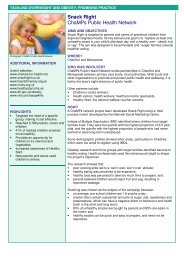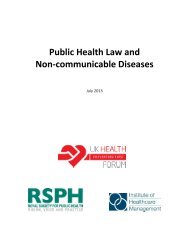The Challenge of Non-Communicable Diseases and Road Traffic ...
The Challenge of Non-Communicable Diseases and Road Traffic ...
The Challenge of Non-Communicable Diseases and Road Traffic ...
Create successful ePaper yourself
Turn your PDF publications into a flip-book with our unique Google optimized e-Paper software.
An Overview 39<br />
Tobacco<br />
<strong>The</strong>re is strong evidence, including from LMIC, to<br />
show that tobacco excise taxes are an effective tool in<br />
reducing tobacco use, particularly amongst the young<br />
<strong>and</strong> the poor, as well as a reliable source <strong>of</strong> government<br />
revenues. Multiple-country examples <strong>and</strong> technical<br />
guidance to assist implementation exist [236].<br />
Increasing tobacco taxes by 10 percent will reduce<br />
tobacco use by up to 8 percent in LMIC as well as an<br />
increase revenues by 7 percent [237]: in South Africa,<br />
for example, each 10 percent increase in price<br />
reduces consumption by 6 percent. A focus on excise<br />
taxes is recommended, relying more on specific than<br />
ad valorem tax, especially where tax administration<br />
is challenging. All tobacco products should be taxed<br />
as relative increases in the prices <strong>of</strong> cigarettes may<br />
lead to substitution by lower-price products – particularly<br />
important given that smokeless tobacco<br />
(snuff or chewing) is more common amongst youth<br />
<strong>and</strong> women. Arguments that higher taxes will have<br />
harmful economic effects, for example by encouraging<br />
smuggling or reducing employment, are false<br />
or overstated [238]: in South Africa the tobacco industry<br />
claims that illicit trade is 20 percent whereas<br />
research indicates it is only 10 percent, underlining<br />
the importance <strong>of</strong> scrutinizing data sources for misinformation<br />
or tobacco industry involvement [94].<br />
Although the Framework Convention on Tobacco<br />
Control (FCTC) has entered into force in most SSA<br />
nations (40 by December 2012 8 ; see Box 3)[239], only<br />
modest progress has been made in its implementation.<br />
While many countries have legislation or policies<br />
on protection from exposure to tobacco smoke,<br />
only a h<strong>and</strong>ful meet required st<strong>and</strong>ards in implementation.<br />
Little progress has been made on packaging<br />
<strong>and</strong> labeling <strong>of</strong> tobacco products <strong>and</strong> while<br />
slightly better progress has been made in banning<br />
tobacco advertising, promotion, <strong>and</strong> sponsorship,<br />
again this is not to required st<strong>and</strong>ards [240]. Lessons<br />
from a review <strong>of</strong> African countries are that an active<br />
tobacco control civil society movement, political<br />
will, <strong>and</strong> active research support are significant<br />
contributors to success [241-242]: in the countries<br />
8 At the time <strong>of</strong> publication, in SSA, Mozambique <strong>and</strong> Ethiopia have<br />
signed but not ratified or entered it into force, <strong>and</strong> Eritrea, Malawi,<br />
Somalia, South Sudan, <strong>and</strong> Zimbabwe have not signed, ratified, or<br />
entered it into force.<br />
with the most successful tobacco control programs<br />
(South Africa, Mauritius, <strong>and</strong> Kenya) partnership<br />
between CSOs <strong>and</strong> government institutions is a key<br />
feature, <strong>and</strong> NGOs in 15 African countries have produced<br />
‘shadow reports’ monitoring compliance <strong>of</strong><br />
their country with FCTC obligations [243].<br />
BOX 3: Regional Response to Tobacco<br />
In 2011, the global tobacco epidemic killed almost six<br />
million people; nearly 80 percent <strong>of</strong> these deaths occurred<br />
in LMIC. Cigarette consumption in Western Europe<br />
dropped by 26 percent between 1990 <strong>and</strong> 2009,<br />
but increased in Africa <strong>and</strong> the Middle East by 57 percent<br />
during the same period. African countries are experiencing<br />
the highest increase in the rate <strong>of</strong> tobacco use<br />
amongst developing countries: the number <strong>of</strong> smokers<br />
in SSA is projected to increase 148 percent by 2030, to<br />
208 million smokers or one-fifth <strong>of</strong> the total population.<br />
Africa is at a crossroads in its response to tobacco control.<br />
On the one h<strong>and</strong>, countries in this region have become<br />
an increasingly attractive market as tougher regulations,<br />
high taxes, <strong>and</strong> greater consumer awareness<br />
in developed countries are ‘closing the door’ to tobacco<br />
imports <strong>and</strong> leading to reductions in use. On the other<br />
h<strong>and</strong>, cigarettes are becoming more affordable as incomes<br />
rise in many African countries.<br />
Significantly, Africa is fighting back. In Africa, 42 percent<br />
<strong>of</strong> countries have already signed the 2003 WHO FCTC,<br />
which binds them to a number <strong>of</strong> anti-tobacco measures.<br />
Additionally, on June 3-5, 2012, the World Bank, in partnership<br />
with the Southern Africa Development Community<br />
(SADC), the Ministry <strong>of</strong> Finance <strong>of</strong> Botswana, the<br />
Bloomberg <strong>and</strong> Bill <strong>and</strong> Melinda Gates Foundations, <strong>and</strong><br />
WHO, convened a high level forum on <strong>The</strong> Economics <strong>of</strong><br />
Tobacco Control: Taxation <strong>and</strong> Illicit Trade. With the participation<br />
<strong>of</strong> delegations from the Ministries <strong>of</strong> Finance,<br />
Trade, <strong>and</strong> Health <strong>of</strong> 14 SADC member countries, the aim<br />
<strong>of</strong> the forum was to promote dialogue on best practices<br />
in effective design <strong>and</strong> administration <strong>of</strong> excise taxes<br />
on tobacco as an instrument to promote public health,<br />
<strong>and</strong> to share knowledge on the dimensions, causes, <strong>and</strong><br />
extent <strong>of</strong> illicit trade in tobacco products <strong>and</strong> strategies<br />
to control it. <strong>The</strong> involvement <strong>of</strong> high-level <strong>of</strong>ficials from<br />
different sectors in the forum underscored the potential<br />
for multisectoral collaboration <strong>and</strong> action to prevent<br />
<strong>and</strong> control tobacco addiction that contributes to ill<br />
health, disability, <strong>and</strong> premature mortality in Africa.



